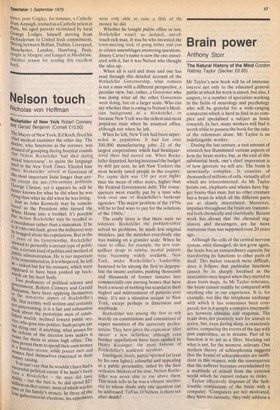Nelson touch
Nicholas von Hoffman
Rockefeller of New York Robert Connery an Gerald Gerald Benjamin (Cornell £10.50) The Mayor of New York, Ed Koch, fired his Chief medical examiner the other day. The doctor, who functions as the coroner, was accused of gossiping during hospital rounds that Nelson Rockefeller 'had died during sexual intercourse', to quote the language used in the New York Times. Elected four times, Rockefeller served as Governor of this most important State longer than .any°Ile except the late-1 8th-centuly politician ,George Clinton, yet it appears he will be Better known for what he did when he was dYing than what he did when he was living. , Just as John Kennedy may be remembered as the President who turned the, i\fftite House into a brothel, it's possible that Nelson Rockefeller may be recalled as a swordsman rather than a statesman. If he ts, it's his own fault, given the indiscreet way h bragged about his copulations. But in the ' Years of his Governorship. Rockefeller seemed to personify a certain type of politiNu, a certain kind of politics and method of PUblic administration. He is too important I °be remembered as, it is whispered, he left 11,s — naked but for his trousers, which were saPposed to have been yanked up backwards on his inert body. wo professors of political science and rpernment, Robert Connery and Gerald tliamin, have been applying themselves the non-erotic aspect of Rockefeller s „Ite. Not terribly well written and certainly rt entertaining, it is a fair and exhaustive iu,00k about the prototypic man of estabIvI:shed Wealth, inclined toward public serhme, Who goes into politics. Such people are dying out: if anything, what passes for i _tile. reform of the election laws makes t ster for them to attain high office. The permit them to spend their own money d limitless stream, while poorer men and :omen find themselves restricted in their money raising. You can't say that he wouldn't have had a Successful political career if he hadn't been ,..)1:11. a Rockefeller — the man did have — but the fact is, he did spend $2.7 tilion on that career, most of which was his ?oven or his family's money. In three of the Ur gubernatorial elections, his opponents were only able to raise a fifth of the money he did.
Whether he bought public office or not, Rockefeller wasn't an isolated, out-oftouch rich man. It was he who invented the town-meeting trick of going hither and yon to citizen assemblages answering questions. Jimmy Carter's name is now the one associated with it, but it was Nelson who thought the idea up.
When all is said and done and one has read through this detailed account of the Rockefeller Governorship, what remains is not a man with a different perspective, a peculiar view, but, rather, a Governor who was doing what all the other Governors were doing, but on a larger scale. Who can say whether that is owing to Nelson's Mediclan background as a Rockefeller, or because New York was the richest and most populous state when he assumed office, although not when he left.
When he left, New York had been superseded in population. It had lost over 300,000 manufacturing jobs: 21 of the largest corporations which had headquartered there had moved out. When Rockefeller departed, having increased the budget by 400 per cent, he left New Yorkers the most heavily taxed people in the country. Per capita debt was 130 per cent higher than the mean of other states, higher than the Federal Government debt. The consequences were exactly put by a man who took over one ol Rockefeller's bankrupt agencies: 'The major problem of the 1970s will be to find ways to pay for the solutions of the 1960s.'
The costly irony is that there were no solutions: Rockefeller the problem-solver solved no problems. he made few original mistakes, just the mistakes everybody else was making on a grander scale. When he came to office, for example, the new tranquilliser drugs to subdue mental patients were becoming widely available. New York, under Rockefeller's leadership, hastened to be among the first to depopulate the insane asylums, pushing thousands and thousands of former inmates into commercially-run nursing homes that have been a source of nothing but scandal in their neglect and mistreatment of patients ever since. It's not a situation unique to New York, except perhaps in dimension and amplitude. Rockefeller was among the first to rely heavily on commissions and committees of expert members of the university professoriate. They have given the expression 'idiot savant' a new definition, although even harsher appellations have been applied to. Henry Kissinger, the most famous of Rockefeller's academic servitors.
Intelligent, lively, public-spirited (at least by his own lights), colourful and appealing as a public personality, aided by the best orthodox thinkers of his time, Nelson Rockefeller was never able to rise above them. This book tells us he was a vibrant mediocrity to whose shade only one question can be addressed: Tell us, 0 Nelson, is there sex after death?






























 Previous page
Previous page